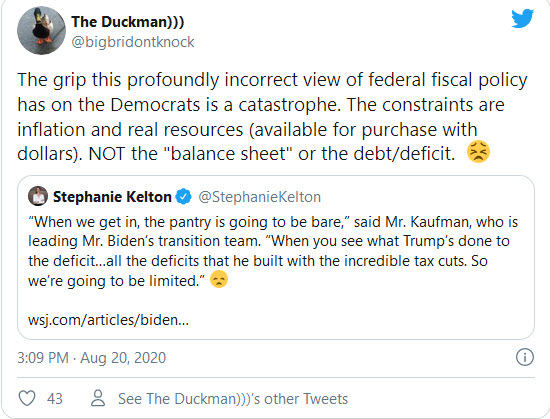Sigh - Biden already has given up on an effective fiscal policy. Welcome to austerity 2.0
I hope this guy is right.
This is a deeply dangerous, economically illiterate lie that is inconsistent with @JoeBiden's platform and core "Build Back Better" messaging. I know for a fact his team knows better than this and this statement must be retracted immediately. pic.twitter.com/xHS6eH9vBp
— Shawn Sebastian
This is a deeply dangerous, economically illiterate lie that is inconsistent with @JoeBiden's platform and core "Build Back Better" messaging. I know for a fact his team knows better than this and this statement must be retracted immediately. pic.twitter.com/xHS6eH9vBp
— Shawn Sebastian (@shawnsebastian) August 20, 2020
economist Dean Baker weighs in
===========================================================
Top Biden adviser, and long-time personal friend, Ted Kaufman was seen in the Wall Street Journal warning that the debt run up by the Trump administration will seriously limit what Biden will be able to do as president. This is wrong big time, and it is the sort of silly thing that no one in a Biden administration should ever be saying.
The government’s ability to spend is limited by the economy’s ability to produce, not the debt. If the government spends too much, it will lead to inflation. When we have a period of high unemployment, as is the case now and almost certainly will still be the case if Biden takes office in January, we are very far from hitting the economy’s inflation barriers.
It takes some very deliberate head in the ground economics to argue that we are somehow limited by the size of the government debt. Japan provides a great model here. Its ratio of debt to GDP is more than 250 percent, more than twice the current U.S. level. Yet, the country is seeing near zero inflation and has a 0.03 percent interest rate on its long-term debt. The interest on its debt is near zero, since much of its debt carries a negative interest rate.
The idea that we would not address pressing needs, like climate change, child care, and health care because we are concerned about the debt burden is close to crazy. As long as the economy is not near its capacity, there is zero reason not to spend to address these priorities, and even when it does approach its capacity, we can impose higher taxes on the economy’s big winners over the last four decades.
I will also throw in one important item of logic that our deficit and debt hawks should be forced to deal with. When the government issues patent and copyright monopolies to pharmaceutical and software and other companies, this is a form of implicit debt. These monopolies are effectively private taxes that the government allows these companies to collect in exchange for their innovations or creative work.
The rent payments on these monopolies run into many hundreds of billions annually and quite possibly exceed $1 trillion a year. They dwarf interest payments on the debt. The debt whiners don’t get to exclude this implicit debt from their calculations just because they like the companies and individuals who benefit from these rents.
If people are having a hard time understanding the logic here, we can go back to pre-revolutionary France. To deal with its huge debt the government would sell off the right to collect specific taxes. I guess Mr. Kaufman and other deficit hawks would say this is fine since the country now had a lower debt burden, but that is not a serious position. It would be good if the economics profession could be united in explaining this simple logic to laypeople, but as is often said, economists are not very good at economics.
The post The Burden of the Debt: Lessons for Biden Adviser Ted Kaufman appeared first on Center for Economic and Policy Research.
I heard that Ted Cruz "warned" that if Biden is elected Elizabeth Warren will be Secretary of the Treasury.
One can only hope!!!
At the risk of repeating... Why why why, with interest rates so low, are we not engaged big-time in bonding/borrowing for the much-needed (and occasionally promised) infrastructure improvements?? This question is for states, localities, school districts as well as the federal government, though those entities face more restrictions.
Oh yeah, forgot, Congress can't even agree on the time of day.
Well, it's not they don't agree. Or more precisely, what they don't agree on is what the government should be doing. The R's don't want the government to do anything unless they can funnel great gobs of money to the private sector. So, they're really not interested in doing much of anything. They could have done infrastructure when they controlled both houses. Instead the only thing they got done in two years was a tax cut.
Hopefully that will all change come November, as long as clowns like Ted Kaufman don't control anything.
Yes, very hopeful for November.
But but, wouldn't the infrastructure projects qualify as funneling gobs of money to the private sector??? not to mention employing a lot of people. This one has really had me stumped for years, even more so since employment tanked this spring.
mjc said:
Yes, very hopeful for November.
But but, wouldn't the infrastructure projects qualify as funneling gobs of money to the private sector??? not to mention employing a lot of people. This one has really had me stumped for years, even more so since employment tanked this spring.
You are right, it would make sense. Don't underestimate how incompetent Trump is as a manager though.
The R's and D's have different approaches towards infrastructure.
drummerboy said:
The R's and D's have different approaches towards infrastructure.
This is from 2016, but it still instructive:
Dems platform: infrastructure is important so here is how we are going to invest in it
GOP platform: while infrastructure is important, and some day we will need to find money to invest in it, for now here are the infrastructure programs we are divesting
Employment Wanted
Latest Jobs
Employment Wanted
-
Our amazing driving nanny is available for work.
Apr 28, 2024 at 8:05am
-
(NO FEES) Hire A Fresh Energetic Nanny/ Housekeeper Here ! (732)-737-7165
Apr 27, 2024 at 1:46am
-
(No Fees) Hire A Baby Nurse Here for Your New Borns! (732)-737-7165
Apr 27, 2024 at 1:46am
-
(NO Fees) Hire Housekeepers Here! ( 732)-737-7165
Apr 27, 2024 at 1:46am
-
(No Fees) Hire Home Health Aides Here! (732)-737-7165
Apr 27, 2024 at 1:46am
-
Summer Private Speech Therapist
Apr 26, 2024 at 9:12pm
-
Apr 26, 2024 at 1:58pm
-
(Classic Painting and Materials) Fair Prices. Spring and Summer Specials
Apr 25, 2024 at 5:14pm
Help Wanted
-
Part Time help for special needs young adult
Apr 27, 2024 at 4:43pm
-
Apr 25, 2024 at 6:15pm
















I was hoping this wouldn't happen, but it looks like the deficit hawks are running the show. Same ol' same ol' crap from the calcified generation of Dems.
(argh, can't embed the tweet)